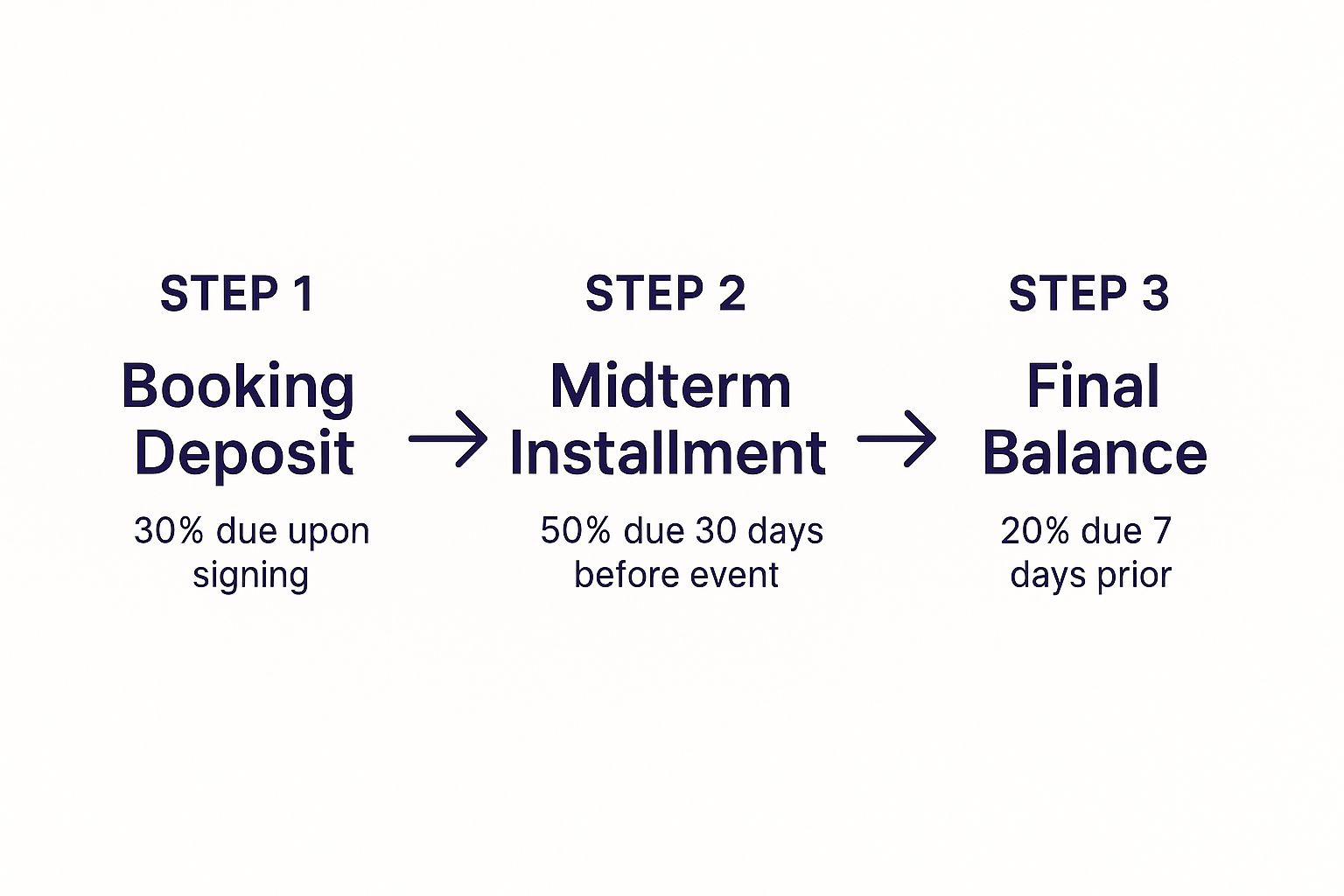Your Actionable Guide to a Flawless Booth rental contract

A booth rental contract is the official rulebook for the relationship between a salon owner and an independent beauty professional renting space in your salon. More than just a lease, this legally binding document lays out every term and condition upfront. Use this guide to create a contract that clearly defines responsibilities, payment structures, and the code of conduct to keep your salon running smoothly and professionally.
Why Your Salon Needs a Bulletproof Contract

Relying on a handshake deal or a generic online template is a major gamble. Vague terms create misunderstandings that can damage your salon's reputation and finances. A strong, customized booth rental contract is your business's roadmap for the professional relationship, protecting both you and your renter from day one.
Consider it the foundation of your business model. This is where you put every detail in writing, ensuring everyone is on the same page before the first client sits down. It's a non-negotiable step, whether you're just learning how to open a beauty salon or you're a seasoned owner looking to professionalize your operations.
Setting Clear Financial and Legal Boundaries
A well-written contract eliminates confusion around money and liability. It clearly states the rent amount, due dates, and the exact consequences for late payments. This financial clarity is essential for maintaining your salon's healthy cash flow.
With average monthly booth rent ranging from $400 to over $1,000, you cannot afford ambiguity.
Beyond payments, a solid contract defines legal responsibilities. Understanding the important legal considerations for salon owners is your first move toward drafting an agreement that holds up. Here are actionable items to include:
- Insurance Requirements: Make it mandatory for renters to carry their own liability insurance. This is a critical step to protect your business from accidents.
- Service Offerings: Specify what services renters can and cannot offer. This helps prevent direct competition under your roof and maintains your brand's consistency.
- Client Policies: Draft a clear clause on client ownership. This prevents a renter from taking your salon’s entire client list if they decide to leave.
By taking the time to create a detailed agreement, you’re doing more than just preventing problems. You're actively building a professional, respectful, and successful salon culture.
Laying the Foundation of Your Agreement

A solid booth rental contract starts with the basics, but the specific details are what truly protect your business. Think of it like building a house frame—every piece must be precise. Let's move beyond generic templates and dig into the core clauses that prevent confusion.
First, clearly identify all parties involved with their full legal names—the salon's legal business name and the renter's. A simple mistake here can cause major headaches later.
Equally critical is correctly classifying the renter. This is a legal distinction with significant tax and liability implications. You must classify the booth renter as an independent contractor, not an employee. For UK salons, it’s vital to be familiar with understanding contractor status through IR35 changes.
Defining the Leased Space and Term
Vagueness is the enemy of a good contract. Don't just write "Booth #3." Your agreement must spell out exactly what the renter gets access to, leaving no room for assumptions.
Be extremely specific in your definition of the leased space:
- The Primary Workstation: Identify the exact chair, mirror, and cabinet space that is exclusively theirs.
- Shared Common Areas: List access rights to shampoo bowls, color processing areas, the break room, restrooms, and laundry facilities.
- Storage Access: Detail any locker or storage space provided for their tools and products.
This level of detail prevents a renter from using a private facial room for a side service or taking client calls in your personal office. It sets clear physical boundaries from the start.
Next, the lease term needs to be crystal clear. Specify the exact start and end dates. An ambiguous term like "for one year" invites disputes over when the year officially began.
Pro Tip: Instead of only an end date, include an automatic renewal clause. Require a 30-day or 60-day written notice from either party if they do not wish to renew. This simple clause saves you from the scramble of a renter leaving without notice or you being unable to fill an unexpectedly empty spot.
Outlining Termination and Notice Periods
Finally, every good agreement needs an exit plan. A termination clause isn't pessimistic; it's professional. It outlines the "what-if" scenarios so you aren't trying to figure things out during a stressful situation.
Your termination clause should cover two main scenarios:
- Termination Without Cause: This gives either party a clean way out for any reason, provided they give a specific amount of notice (e.g., 30 days). This offers necessary flexibility for both you and the renter.
- Termination With Cause: This is your eject button. List the specific actions that constitute a breach of contract and allow for immediate or faster termination. Include non-payment of rent, damaging salon property, or serious violations of your salon's code of conduct.
Having these terms spelled out in your booth rental contract creates a clear, professional, and enforceable roadmap for ending the relationship, protecting your salon's operations and your peace of mind.
Structuring Payments and Financial Terms
Keeping the money talk crystal clear is the best way to avoid awkward conversations. When you nail this part of your booth rental contract, both you and your renter know exactly where every dollar is going.
Setting Clear Rent Clauses
Start by spelling out the rent amount and the exact due date. Avoid vague language. Whether it’s $500 per month due on the 1st or $125 weekly every Monday, state it plainly.
Use a checklist to ensure you cover the essentials:
- [ ] Rent Amount: Specify the exact figure and frequency (weekly/monthly).
- [ ] Due Date: "1st of each month" or "every Monday."
- [ ] Payment Methods: List acceptable forms like bank transfer, online portal, check, or mobile apps.
- [ ] Late Fee Structure: Define the penalty, for instance, a $25 fee if rent is 3–5 days late, escalating by $10 for each additional week.
These details eliminate any future "I thought you meant…" moments.
Covering Operational Costs
Rent often covers more than just the chair. Outline who is responsible for utilities, shared supplies, and software fees to prevent disputes over unexpected costs.
Create a clear breakdown of these additional costs:
- Utilities: Specify how electricity, water, gas, and Wi-Fi costs are split. Is it a flat fee or a percentage?
- Back-Bar Products: State whether shared items like shampoo and conditioner are included, available for an additional fee, or the renter's responsibility.
- Laundry Services: Clarify if the salon provides clean towels and capes or if the renter must handle their own.
- Booking Software: Note if access is included in the rent or billed as a separate monthly fee.
Clarity here keeps everyone focused on clients, not on debating expenses.

Sample Payment Schedule And Late Fee Structure
Use this table as a template in your contract. It clearly outlines due dates, grace periods, and escalating late fees for easy reference.
| Item | Details |
|---|---|
| Rent Due Date | 1st of each month |
| Grace Period | 5 days |
| Late Fee (3–5 Days Late) | $25 |
| Additional Late Fee (Per Week) | $10 |
| Accepted Payment Methods | Bank Transfer, Check, Venmo, Salon Portal |
Adapt this structure with the numbers and terms that fit your salon’s financial rhythm.
Security Deposits And Fees
A security deposit is your safety net against property damage or unpaid final rent. State the exact deposit amount and list the specific conditions for withholding any portion of it.
Action Step: In the contract, outline how and when the deposit will be returned—typically within 30 days of the contract's end—and require a final walkthrough inspection signed by both parties.
Finally, research local tax laws. In some areas, booth rent is subject to sales tax. Consult an accountant to ensure compliance. For more tips on financial health, review our guide on cash flow management for small business. When every financial detail is defined, your contract becomes a tool for smooth operations.
Defining Your Salon’s Vibe and Rules

Your salon's atmosphere is a key part of your brand. A mismatched vibe can confuse clients and harm your business. Your booth rental contract is the ideal place to establish the operational rules that protect your salon's unique environment.
A salon owner once told me they lost 15% of their walk-in traffic after a new renter started blasting loud, inappropriate music. Don’t let that be you.
To keep everyone aligned, your agreement must codify the house rules on key areas like:
- Operating Hours (including a buffer for setup and cleanup)
- Booking protocols and cancellation policies
- Guest policies and rules for common areas
- Cleanliness standards for stations and shared equipment
Setting Salon Schedule Guidelines
When everyone’s schedule is coordinated, the client experience feels seamless. Start by defining the salon’s official opening and closing times, including any exceptions for late appointments.
A key implementation step is requiring all renters to use the salon's central booking system. This prevents double-bookings and scheduling chaos. Your contract should also state that you will provide the necessary tools and training for the system.
Here are three actionable booking rules to include:
- All bookings must be confirmed 24 hours prior to the service.
- Cancellations require at least 12 hours’ notice to avoid a penalty fee.
- Walk-in availability must be clearly marked on the salon calendar daily.
“Just getting clear on our booking rules cut our no-shows by 30%. It was a game-changer.” — Salon Owner Case Study
Maintaining a Professional Code of Conduct
Your salon's culture is built on consistent, professional behavior. This is where you set clear expectations on everything from noise levels and professional attire to how everyone interacts with guests.
For example, a simple clause limiting personal music volume to 70 decibels can make a huge difference in keeping the atmosphere relaxing.
Use a table to clearly assign responsibilities for shared spaces:
| Responsibility | Shared Resource Rules | Renter Obligations |
|---|---|---|
| Shampoo Station | Sign up on the shared schedule. | Clean after each use and notify management if supplies are low. |
| Back-Bar Products | The salon provides basic stock. | Replace any items you completely use up. |
| Break Room | Keep it tidy and respect posted hours. | Remove all personal items at the end of your shift. |
To implement these rules effectively:
- Post the guest policies at the reception desk.
- Schedule quick, weekly walkthroughs to check on cleanliness.
- Discuss the code of conduct during onboarding.
When the rules are fair and clear, your renters feel empowered to do their best work, and your clients feel valued and respected. It’s a win-win.
Guest Interaction Policies
Your contract should clearly outline how renters are expected to greet and manage guests. For instance, you could require a warm welcome within 30 seconds of a client's arrival or mandate a brief, consistent salon tour for all new clients.
“We implemented a standardized greeting protocol, and our referral traffic shot up by 20% in just one quarter. It’s that first impression that counts.” — Salon Owner Testimonial
Enforcing Cleanliness Standards
A sparkling clean station communicates that you care about client health and safety. This is non-negotiable. Your contract must require renters to thoroughly sanitize all surfaces and tools after every single service.
Specifying a 5-minute station cleanup time between clients can keep the daily schedule flowing smoothly. You should also outline which EPA-approved cleaning solutions to use and the proper procedures for disposing of waste.
Here are a few essential cleaning rules to include:
- Sanitize all tools between clients using an EPA-approved disinfectant.
- Empty and wash your workstation tray at the end of each shift.
- Report any equipment malfunctions to management within 24 hours.
“A serious commitment to cleanliness boosted our repeat client rate by 18% in six months. Clients notice, and they appreciate it.” — Salon Owner Insight
Adding these clauses to your booth rental contract isn't about being controlling; it's about protecting your salon's reputation, ensuring client safety, and creating an environment where everyone can succeed.
Managing Liability and Insurance Requirements
Let's discuss liability. Protecting your business from worst-case scenarios is the bedrock of a sustainable salon. A single slip-and-fall, allergic reaction, or chemical burn can spiral into a financial nightmare.
Your booth rental contract is your shield. Your job is to draw a clear line defining who is responsible when things go wrong.
The single most important action you can take is to make it mandatory for every renter to carry their own professional liability insurance. This is non-negotiable. Their business operates under your roof, but their insurance policy must be the first line of defense if their actions cause a problem.
Mandating Renter Insurance
Your contract needs a clause that spells out insurance requirements in no uncertain terms. Be explicit to avoid any misinterpretation.
- Minimum Coverage Amount: Require a minimum of $1 million per occurrence and $2 million aggregate for general and professional liability. These are industry-standard amounts that offer substantial protection.
- Proof of Insurance: State that the renter must provide a "Certificate of Insurance" (COI) before their start date. Make this a condition of receiving their station keys.
- Additional Insured: This is crucial. The clause must require the renter to name your salon as an "additional insured" on their policy. This critical step means their insurance must also cover your business if a claim arises from their work.
This language makes it clear that a renter's mistake won't become your financial catastrophe.
Understanding the Indemnification Clause
An indemnification clause is your legal backup. In simple terms, this clause states that the renter agrees to cover any costs, damages, or legal fees you incur because of something they did or failed to do.
It is their formal promise to "hold you harmless."
Real-World Scenario: A renter improperly applies a chemical treatment, causing a client a severe reaction. The client sues both the renter and your salon. With a strong indemnification clause, your renter is contractually obligated to pay for your legal defense and any judgment against you, shielding your business assets from their error.
This clause works hand-in-hand with their liability insurance. It places financial responsibility squarely on the renter's shoulders. By pairing mandatory insurance with a rock-solid indemnification clause in your booth rental contract, you’re building a legal fortress around your salon's future.
Planning for Endings and Resolving Disputes
Professional relationships don't always last forever. Planning for a renter's departure is smart business. A well-drafted booth rental contract provides a clear game plan for when the agreement ends, whether it's an amicable departure or a more complex situation.
Think of this section as your official exit strategy. It saves you from the chaos of a stylist disappearing overnight or one who refuses to leave after breaking the rules. By putting the terms of departure in writing, you remove the emotion and guesswork from a potentially difficult process.
Crafting a Clear Termination Clause
Your termination clause is the rulebook for ending the rental relationship. To be effective, it must be specific, fair, and legally sound. Ambiguity invites arguments and legal headaches.
First, establish the notice period. A 30 to 60-day written notice is standard for a "no-fault" termination, where either party can end the agreement for any reason. This gives you time to find a new renter and them time to find a new salon.
Next, get specific about what constitutes a breach of contract. These are serious violations that allow you to terminate the agreement more quickly.
Actionable items to list as grounds for termination include:
- Non-Payment of Rent: Specify the exact number of days late that triggers a contract default.
- Repeated Policy Violations: This covers a renter who consistently ignores salon rules for cleanliness, client conduct, or professional behavior. This concept is similar to having well-defined salon cancellation policies.
- Illegal Activities: State that any illegal conduct on salon property is grounds for immediate termination.
- Damage to Salon Property: Clearly define what qualifies as significant damage beyond normal wear and tear.
Including a Dispute Resolution Process
Disagreements can happen, but they don’t have to escalate into expensive legal battles. Adding a dispute resolution clause to your contract can save you thousands of dollars and significant stress. This clause requires both parties to follow a specific process for handling conflicts before initiating legal action.
A common and effective approach is to require mediation first. A neutral third party helps you and the renter find a mutually agreeable solution. This process is almost always faster, less adversarial, and far cheaper than going to court.
By making mediation a required first step in your contract, you create a structured, professional framework for resolving problems. It's a proactive measure that demonstrates fairness and can help preserve professional relationships, even during a disagreement. This clause is a must-have for any salon owner focused on long-term stability.
Clearing Up the Common Questions on Booth Rental Contracts
Navigating the details of a booth rental contract can feel overwhelming. Let's tackle some of the most common questions from salon owners to help you build your agreement with confidence.
What's the Single Biggest Mistake Salon Owners Make?
The biggest mistake is using a generic, one-size-fits-all template from the internet. These documents are legal landmines because they fail to account for the unique operational details of a salon, like rules for retail products or managing shared spaces like shampoo bowls.
Worse, they are often not compliant with your specific state or local laws. This oversight can leave you exposed to disputes and financial liabilities that a customized contract would have prevented.
Can I Just Change the Contract After It's Signed?
No. Once a contract is signed, it is a legally binding document. You cannot unilaterally change the terms. Any modifications, from rent increases to rule changes, require written consent from both you and the renter.
The proper way to make changes is with a formal addendum or amendment. This separate document outlines the agreed-upon changes, is signed by both parties, and is then attached to the original contract, making the update legally valid.
How Do I Actually Enforce the Rules Without Being the Bad Guy?
Effective enforcement relies on consistency and professionalism. Address rule-breaking privately and promptly, referencing the specific clause in your agreement. Do not let violations slide, as this sets a precedent that the rules are optional.
Key Takeaway: The foundation of enforcement is documentation. Keep a written record of conversations about rule violations. If the behavior continues, follow the warning and termination steps you already outlined in your contract. By being fair, consistent, and professional, you maintain a positive atmosphere and ensure your contract is an effective tool for managing your salon.
Ready to attract top talent to your salon? The first step is a stunning, professional website that showcases your brand. gohappybeauty provides beautiful, SEO-optimized websites designed specifically for beauty professionals like you. Get started with gohappybeauty today!
Grow your beauty business
Our focus is, and always will be, helping you improve your online presence and generate more business from your website. That is what we do, for you.

